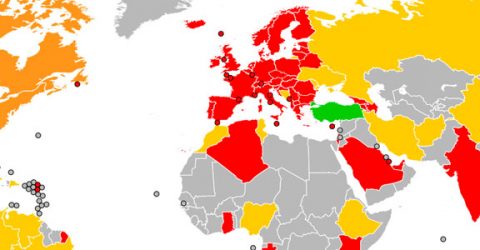How well does the UK’s broadband infrastructure perform globally?

Broadband speeds are faster than ever across the UK, yet our demand for bandwidth and connectivity is also hitting new peaks on a regular basis.
That’s created a situation where improving line speeds aren’t resulting in greater consumer satisfaction.
Indeed, in an age when several members of one household might be attempting to stream multimedia content at the same time, high-speed broadband has never been as important.
Such challenges aren’t unique to us – bandwidth requirements are soaring around the world as social media and streamed content grow in popularity.
How are national speeds tested and calculated?
Every year, Google and Princeton University conduct an authoritative test of broadband speeds across 200 countries.
Their research involves 163 million separate tests using 37 million distinct IP addresses, calculating average transfer speeds in Megabits per second.
In the last year, global speeds increased from an average of 7.4Mbps to 9.10Mbps.
However, headline figures mask huge disparities between the fastest nation (Singapore recorded over 60Mbps) and the slowest (Yemen managed just 0.3Mbps).
How do domestic broadband speeds compare internationally?
Not very well, sadly.
Unsurprisingly, the UK outperforms third-world nations like East Timor (0.49) and Somalia (0.6).
Unfortunately, the comparisons aren’t as flattering with Western countries.
The UK’s average transfer speed (test your speed here) of 18.5Mbps was beaten by nations including Iceland (18.85), the former Communist state of Poland (19.73) and even tiny Andorra (27.14).
Andorra’s results are remarkable for a nation with less than 80,000 inhabitants, yet it barely scraped into the global top 20.
The UK’s performance looks particularly dismal when you consider Luxembourg almost doubled our average line speed, while Belgium actually did.
The impoverished Eastern European nation of Romania measured 38.6Mbps, while Norway, Sweden and Denmark all surpassed 40Mbps.
Not only did the UK fall four places to 35th overall, France and Madagascar both managed to leapfrog us by improving their connection speeds to a greater extent than we did.
What does it all mean?
It takes roughly 15 minutes to download a 5GB HD movie in Sweden and Denmark, whereas a typical UK resident would have to wait over 35 minutes.
Waiting an extra twenty minutes to finish a download isn’t disastrous, but even a fractional delay in online gameplay may ruin the user experience.
It’s easy to imagine the challenges facing home workers attempting to use cloud-based software, or holding video conference calls across creaking broadband infrastructure.
So what’s being done about it?
The roll-out of fibre broadband is spearheading improvements in connection speeds, but it will take at least another decade to complete, by which time we’ll be even further behind.
Openreach has already rejected the prospect of large-scale Fibre to the Premises connections, preferring a commitment to Fibre to the Cabinet despite Government pressure.
Openreach’s preferred option relies on outdated copper wires linking homes to local exchanges, slowing data down on the last stage of its journey.
The slow rollout of fibre broadband led to Openreach being forcibly decoupled from BT in 2016 by Ofcom.
However, promising to give three million more people fibre connections by 2020 is unlikely to plug the attainment gap with our Continental neighbours.
The only viable alternative involves Virgin Media’s FTTP services, which consistently record the country’s fastest upload and download speeds.
The latest Virgin infrastructure is theoretically capable of averaging 360Mbps, though only 60 per cent of the country is cabled and therefore in a position to subscribe.
Nonetheless, this remains the best option for people requiring ultrafast connectivity.






